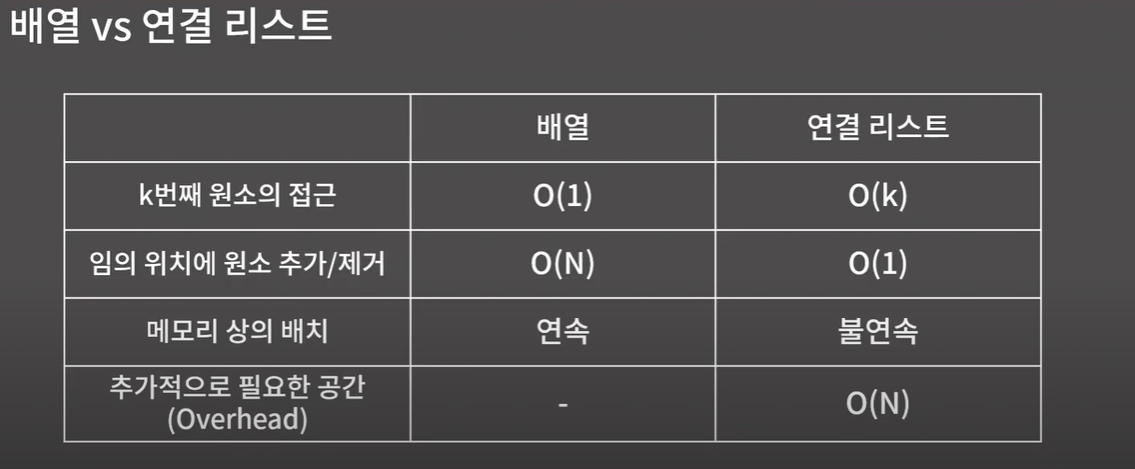정의와 성질
연결리스트의 성질
-
K번째 원소를 확인/변경 하깅 위해 O(K)가 필요함
-
임의의 위치에 원소를 추가/임의 위치의 원소 제거는 o(1)
-
원소들이 메모리 상에 연속해있지 않아 히트레이트가 낮지만 할당이 쉬움
연결 리스트의 종류
단일 연결 리스트 : 뒤로만 연결
이중 연결 리스트 : 앞뒤로 연결 (STL)
원형 연결 리스트 : 끝이 뒤를 가지고 있음배열 vs 연결 리스트
두 자료구조모두 선형 자료구조임

1406 에디터
#include <bits/stdc++.h>
using namespace std;
list <char> Edit;
int main()
{
ios_base::sync_with_stdio(0);
cin.tie(0);
string str;
cin >> str;
for (char c : str)
{
Edit.push_back(c);
}
int n;
cin >> n;
auto t = Edit.end();
for (int i = 0; i < n; i++)
{
char command;
cin >> command;
if (command == 'L')
{
if (t != Edit.begin())
t--;
}
else if (command == 'D')
{
if (t != Edit.end())
t++;
}
else if (command == 'B')
{
if (t != Edit.begin())
{
t--;
t = Edit.erase(t);
}
}
else
{
char c;
cin >> c;
Edit.insert(t, c);
}
}
for (char c : Edit)
{
cout << c;
}
}STL list를 활용해볼수있는 문제이다 모두 문제의 조건을 따르되 erase를할때 커서의 앞문자를 지워야하므로 앞으로 간뒤 삭제한다.
5397.키로거
#include <bits/stdc++.h>
using namespace std;
int main()
{
ios_base::sync_with_stdio(0);
cin.tie(0);
int n;
cin >> n;
for (int i = 0; i < n; i++)
{
list <char> key;
auto t = key.begin();
string command;
cin >> command;
for (char c : command)
{
if (c == '<')
{
if (t != key.begin())
t--;
}
else if (c == '>')
{
if (t != key.end())
t++;
}
else if (c == '-')
{
if (t != key.begin())
{
t--;
t = key.erase(t);
}
}
else
{
key.insert(t, c);
}
}
for (char c : key)
{
cout << c;
}
cout << '\n';
}
}위 문제와 동일한 방식으로 풀면 해결할수있다.
1158.요세푸스 문제
#include <bits/stdc++.h>
using namespace std;
int main()
{
ios_base::sync_with_stdio(0);
cin.tie(0);
list <int> yose;
int n, k;
cin >> n >> k;
for (int i = 1; i <= n; i++)
{
yose.push_back(i);
}
cout << '<';
while (!yose.empty())
{
for (int i = 0; i < k -1; i++)
{
yose.push_back(yose.front());
yose.pop_front();
}
cout << yose.front();
yose.pop_front();
if (yose.empty())
{
cout << '>';
}
else
{
cout << ", ";
}
}
}1부터 n까지의 숫자를 yose리스트에 집어넣고 k-1번동안 리스트의 맨앞의인자를 뒤로 넣어준다.
다음 리스트이 맨앞의 인자를 pop해줌으로써 요세푸스 순열을 구현할수있다 다음 출력형식에 맞게 출력을 해주면 된다.

